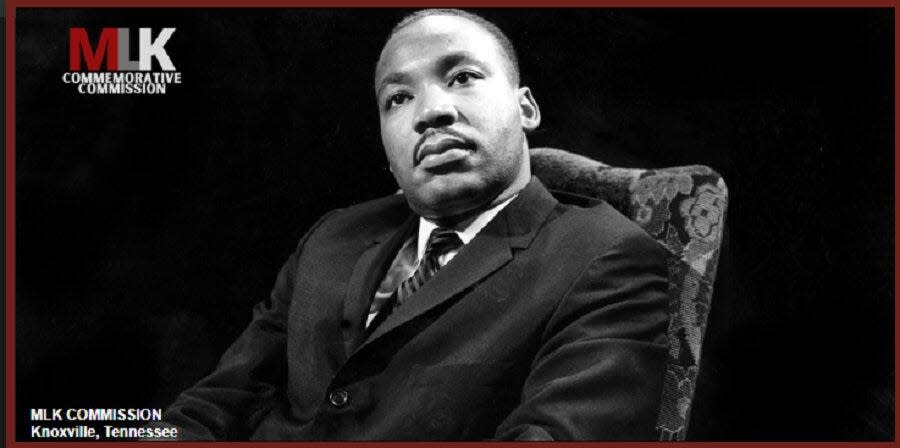This is no time to pretend that MLK would be satisfied with America | Opinion
- Oops!Something went wrong.Please try again later.
Each year at this time, we celebrate the remarkable Dr. Martin Luther King. From 1955 until 1968, King was the civil rights movement’s most prominent leader. He organized marches and protests for voting rights, desegregation, labor and peace. He became the first president of the Southern Christian Leadership Conference and led the historic 1963 March on Washington. The civil rights movement resulted in monumental legislative and social gains for Black Americans. But we have largely reduced the legacy and reality of King to a “postage stamp version" of who he was and what he believed.
We have largely forgotten that many considered King a loud-mouthed “radical” who hated America. In a 1966 Gallup poll, 63% of Americans gave King an “unfavorable” rating with 39% rating him as the most unfavorable possible. He was arrested 29 times for civil disobedience and even trumped-up charges like speeding. The FBI and other government agencies virtually tortured King and his family — covertly surveilling and harassing them, repeatedly attempting to infiltrate Dr. King’s circle and stop his work, and even sending him an anonymous letter urging him to kill himself.
We have swept under the rug King’s many sharp criticisms of America outside of the racial sphere. King hated imperialism and the American war machine. After he condemned the Vietnam War, the FBI declared that King had “been influenced by Communist advisors” and increased their surveillance. King called America “the greatest purveyor of violence in the world” and said that our “allegiances and loyalties” should be “deeper than nationalism” and "go beyond our nation's self-defined goals and positions.” He loathed the American military-industrial complex, saying we should not let it “control this country,” urging America to undergo a “radical re-ordering of priorities.”

King blamed many ills upon America’s brand of virtually unfettered capitalism — including wealth and income inequality and failings in socioeconomic and racial justice. In an August 1967 speech, he opined, “And one day we must ask the question, ‘Why are there forty million poor people in America?’ And when you begin to ask that question, you are raising questions about the economic system, about a broader distribution of wealth. When you ask that question, you begin to question the capitalistic economy. … We’ve got to begin to ask questions about the whole society…”.
In a 1961 speech, King remarked, “Call it democracy, or call it democratic socialism, but there must be a better distribution of wealth within this country for all God’s children.”
King was not shy about criticizing a status quo that wanted incremental change while Black Americans were being viciously attacked by individuals, the military, fire hoses, and police dogs while peacefully protesting in the streets. He recognized what was at stake for Black Americans — and the nation as a whole — and outright rejected incrementalism. During his iconic 1963 “I Have a Dream” speech, he declared, “This is no time to engage in the luxury of cooling off or to take the tranquilizing drug of gradualism.” In his Letter from Birmingham Jail, he offered a stinging critique of the white moderate for being “more devoted to order than to justice.”
King was considered most “dangerous” by powerful individuals and entities when he began to focus less on racial equality and more on class. In 1967, he announced the “Poor People’s Campaign” to address wealth and income inequality, good jobs, living wages, quality benefits, unemployment insurance and education for poor adults. In March 1968, he described the campaign as “the beginning of a new cooperation, understanding, and a determination by poor people of all colors and backgrounds to assert and win their right to a decent life and respect for their culture and dignity.” He built a leadership team, network and membership that spanned the racial spectrum. The next month, King was assassinated.
Today, many of the very issues that concerned King to his core are worse than ever.
This is no time to pretend that King wasn’t dedicated to uprooting all systems of oppression and injustice in America.
This is no time to pretend that King didn’t despise the American war machine, imperialism and the status quo.
This is no time to pretend that King didn’t favor major leaps and not minor steps forward for everyday Americans.
This is the time to honor King for who he really was, to pick up the torch and continue his “radical” work.
Eric Morrison is the state representative for the 27th District, which is centered in the Glasgow area and includes parts of Newark, Bear, and Middletown.
This article originally appeared on Delaware News Journal: Martin Luther King Day: It's no time to pretend America is OK

